- Home
- Beverley Harper
Echo of an Angry God
Echo of an Angry God Read online
Beverley Harper died of cancer on 9 August 2002. She rests at peace in the Africa she so loved.
Her ashes lie by the Boteti River in Botswana, below a lodge called Leroo-la-Tau. It means Footprints of Lion.
It is a special place.
This simple plaque marks her passing:
CONTENTS
ONE
TWO
THREE
FOUR
FIVE
SIX
SEVEN
EIGHT
NINE
TEN
ELEVEN
TWELVE
THIRTEEN
FOURTEEN
FIFTEEN
SIXTEEN
SEVENTEEN
EIGHTEEN
NINETEEN
TWENTY
First published 1998 in Macmillan by Pan Macmillan Australia Pty Limited This edition published 1999 in Pan by Pan Macmillan Pty Limited 1 Market Street, Sydney
Reprinted 2001 (twice), 2003, 2004 (twice), 2006, 2007, 2009
Copyright © Beverley Harper 1998
The moral right of the author has been asserted.
All rights reserved. No part of this book may be reproduced or transmitted by any person or entity (including Google, Amazon or similar organisations), in any form or by any means, electronic or mechanical, including photocopying, recording, scanning or by any information storage and retrieval system, without prior permission in writing from the publisher.
National Library of Australia cataloguing-in-publication data:
Harper, Beverley. Echo of an angry god.
ISBN 978 0 330 36127 9.
I. Title.
A823.3
Typeset in 11.5/13pt Bembo by Post Pre-press Group, Brisbane Printed in Australia by McPherson’s Printing Group
This novel is a work of fiction. Names and characters are the product of the author’s imagination or are used fictitiously and any resemblance to actual persons, living or dead, is entirely coincidental.
Papers used by Pan Macmillan Australia Pty Ltd are natural, recyclable products made from wood grown in sustainable forests. The manufacturing processes conform to the environmental regulations of the country of origin.
These electronic editions published in 2010 by Pan Macmillan Australia Pty Ltd
1 Market Street, Sydney 2000
Copyright © Beverley Harper 1998
The moral right of the author has been asserted.
All rights reserved. This publication (or any part of it) may not be reproduced or transmitted, copied, stored, distributed or otherwise made available by any person or entity (including Google, Amazon or similar organisations), in any form (electronic, digital, optical, mechanical) or by any means (photocopying, recording, scanning or otherwise) without prior written permission from the publisher.
This ebook may not include illustrations and/or photographs
that may have been in the print edition.
Echo of an Angry God
Beverley Harper
Adobe eReader format 978-1-74262-689-5
EPub format 978-1-74262-691-8
Mobipocket format 978-1-74262-690-1
Online format 978-1-74262-688-8
Macmillan Digital Australia
www.macmillandigital.com.au
Visit www.panmacmillan.com.au to read more about all our books and to buy both print and ebooks online. You will also find features, author interviews and news of any author events.
This book is for my family
and especially
Mona and Fairy.
This book is also dedicated
to the memory
of Debbie Gange-Harris.
I wish to thank Associate Professor Peter Flood, Head, School of Physical Sciences and Engineering at the University of New England for his assistance in matters dealing with oil exploration.
And a thousand thanks to my friends Margie and Terry O’ Callaghan in Malawi for their hospitality.
No book is ever as good as it might be without considerable input from editors.
Cate Paterson and Alexandra Mohan – two of the best.
Thank you.
ONE
LIKOMA ISLAND – 1694
The barest ripple disturbed the mirror surface of dark water. Reeds along the shore swayed, languid and serene. A fish eagle called, high and wild, and was answered by its mate. The sultry air was heavy and redolent with anticipation. Tiny wavelets ran silently onto the sandy beach and slid, with no energy, back again, leaving a watermark no more than the length of a man’s little finger on the absolute whiteness of the unblemished sand.
Rocks separated the beach from the small cove – smooth, round boulders of a sandstone colour, their external features revealing evidence that once, when the lake was higher, they had been submerged. In the gathering gloom of approaching night, the deep water of the cove appeared silky black, cut by ribbons of silver as unseen currents flowed below the surface.
Diogo Pegado was not a coward. At thirty-eight, he had fought many battles. He regularly travelled the largely unexplored African hinterland where most men feared to tread. He navigated Africa’s wild and unpredictable coastline. He had seen men die of disease, of snake bite and of their injuries in battle. Aware that his own fate was as insubstantial, as unpredictable as that of others, he nonetheless perceived life to be a set of challenges, there to be conquered, with no place for regret and recrimination. Such was life. Diogo Pegado had no time for cowards and milksops. He believed men brought their own sufferings onto themselves. He was immune to suffering.
But what Diogo Pegado was about to witness in the deepening velvet night brought him out in a sweat of dread that prickled in his armpits and threatened his legs with collapse.
King Lundu was an immense man of indeterminate age. He bore his status with a precise, almost pedantic dignity which his subjects knew tolerated no disobedience. Rolls of fat under his chin, along arms and legs and around his waist gave his almost hairless body authority and presence. His subjects took his size to mean enormous strength of limbs and heart. He ruled his small kingdom in the manner of all kings of the day – with fear, obedience and blind worship being prerequisites for staying alive.
At a signal from the King, torches were lit, throwing their flickering light onto the inky water of the cove and made shadows of the gathered people of King Lundu dancing on the rocks like disembodied stick figures. The big bonfire at the burning place up on the hill was also set alight, flaring immediately, sending flames into the air which could be seen from the mainland. Diogo Pegado shivered in spite of the warmth of the evening. Death could surely not be more horrible than what was about to take place.
Ng’ona saw the flames. At three metres beneath the surface, he flicked his tail and glided in a circle. His small reptilian brain made the connection – food. He waited. At the first splash he would propel himself upwards, taking the body around the waist as a bird would grasp a fish in its beak and, rolling backwards in a spiral, spin down to the bottom, where he would hold the victim until it stopped its ineffectual attempts to escape, until the last bubble of oxygen floated in an effervescent string upwards and death stilled the flailing limbs. Then, and only then, would he glide effortlessly to the place he took all his food and stash the body for several days, until the flesh began to rot and the putrid smell of it would tell Ng’ona that the food was ready to tear and grind.
Diogo Pegado glanced across at the intended sacrifice. A proud young man in the prime of life. Muscles bulged under very black skin and, in the bonfire’s red glow, the sheen of nerves glistened, accentuating the man’s strong body. He stood erect, head held high. His fate was sealed and there was nothing he could do but die with dignity. Diogo saw the slig
ht tremor in his limbs and wondered what was going through the man’s head right at this minute. Would he jump? Or would he need to be thrown? To die a coward in these people’s eyes meant he would remain an unhappy spirit for eternity. What kind of courage was required to throw oneself from the high boulder where he stood, into those dark and dangerous waters? Despite his dispassionate regard for other men’s lives, Diogo could not help but reflect that this man’s death would be a waste of a good, strong warrior.
Sweat ran down the Portuguese man’s face but he dared not wipe it away. Any sign of weakness on his part would be noticed. The natives placed great importance on a man’s courage. Diogo was being tested as surely as the unfortunate wretch on the boulder. He needed the King’s help more than the King needed his, and so he willed himself to ignore the sweat stinging his eyes and the biting discomfort of mosquitoes as they rose in their hordes and enjoyed their nightly feasting on human blood.
To keep his mind busy, Diogo wondered why the King had chosen this particular young man to die. His decision had seemed casual, a response to Diogo’s question, ‘Will it be safe?’ The King had clicked his fingers and the warrior had stepped forward with no hesitation. No expression of fear crossed the young man’s face as the King ordered him to die.
Drums began an awful death roll.
Three metres down, Ng’ona felt, rather than heard, the throb of the drums. Still he glided in lazy circles. The food thrown to him from time to time was easy prey, no match for his speed and strength. At just over five-and-a-half metres long, he was powerful enough to bring down a rhinoceros and fast enough to catch a full-grown impala if the need arose. He was 164 years old and, unless some misfortune befell him, would live another fifty to seventy years. Longevity seemed assured. No-one dared to even think of harming him. He was, it was whispered, the spirit of King Lundu’s ancestral great-grandfather, returned to this earth in the form of a crocodile, to protect the King and those favoured by the King. He lived in a cave under the water and patrolled the small cove and the waters beyond, secure in his size and strength, protected, revered and feared.
Diogo looked back at the boulder. The warrior stood alone, unguarded. He supposed the man could run, but where would he go? The island of Likoma was eight kilometres long and no more than four kilometres wide. The closest land was thirteen kilometres away. Like most of King Lundu’s subjects, Diogo suspected the man could not swim more than a few strokes.
It was fully dark now, the silky black water tinged pink by the fires. King Lundu rose slowly from his Stool of Life, his beaded crown glinting, the special serpent design seeming to come alive in the flickering light. Beside him, musicians blew loud mournful notes on their siwas – intricately carved ivory horns of varying tones – and, added to the beating drums, the night air throbbed with a message of death. The King raised his arms and the sudden silence was almost painful.
Diogo Pegado saw the man on the boulder gather himself to jump. With no hesitation, no final words, no last-minute look at his family, he leapt high in the air, as if to postpone the final, horrible moment of terror, and plunged, feet first, into the jet black embrace of unimaginable horror. He disappeared under the glassy water and bobbed to the surface immediately. Almost in slow motion, he struck out for the shore, swimming with the awkwardness of one who can barely stay afloat. Ng’ona hit him midriff with such force that man and beast rose from the water by nearly two metres, foam coursing back over the long snout and slit yellow eyes. Diogo saw the black man’s eyes go wide as terror, disbelief, pain and the inevitability of his own death hammered into his brain. He was held in the crocodile’s mouth, fastened by teeth already crushing flesh and bone from the sheer strength of those terrible jaws. The warrior’s arms and legs flailed uselessly, still in a swimming motion, as if he had not yet realised he was out of the water. Ng’ona slapped back on the surface with a spray of water that was already redder than the light from the fires. Diogo caught one more glimpse of the young man as the crocodile rolled and vanished with an almost casual flip of his powerful tail. Flickering torches played over the water in the cove. Within minutes, the mirror surface returned and the dead man and the reptile might never have been there.
Without a word, King Lundu sat down on his Stool of Life and bearers raised the palanquin in one fluid movement, so as not to anger him. Six young men, hand-picked for the job for their strength, sureness of foot and the ability to work as a team. The King had to be carried up a narrow and steep stairway, fifty-eight steps carved into a gigantic rock face, which led from the beach directly to the largest of his five courts atop a hill. To do this without rocking or unsettling their ruler required their utmost concentration. Priests and elders followed the palanquin. Diogo Pegado, as guest of honour, climbed the steps behind the priests. The rest of the village kept a respectful distance behind him. The last allowed up the steps were the family of the dead warrior.
Lamp niches, hundreds of them, glowed and lit the way. The courts of King Lundu stretched away towards Macholo, the highest point on the island, an astonishing feat of architectural and stone masonry excellence. Having reached the top of the hill the bearers, with no discernible shift in their rhythm, carried the King across the audience court and along an arcade which ran down the far side. At the entrance to one of his reception rooms he was gently lowered. Courtiers stepped forward to remove the Stool of Life, the swords and umbrellas which always accompanied King Lundu and hastily bore them away for safe-keeping. Diogo waited in the arcade. A movement at his side told him his interpreter had found him.
The King beckoned and entered the reception room. There, seated at one end on stone steps and flanked by priests, elders and soldiers, he waited until Diogo and his interpreter were settled in front of him. ‘Are you satisfied?’
‘Yes, Holy One. The treasure will be safe.’
‘Tell us how you came by such treasure.’
The King had been greatly impressed with the volume of necklaces, carvings, bowls, masks, ceremonial staffs and stools of all sizes and designs. Some were solid gold. Others were constructed of wood and then covered in sheets of beaten gold. Diogo had filled the hold of his ship with them. A second vessel had been loaded with grain and cloth, beads and ivory, live animals and barrels of rum – gifts for the King.
Diogo had done business with King Lundu before. Until last year, his ships contained the results of legal trading – coiled wire of iron, copper, bronze and gold; sheets and beads of gold; necklaces, bracelets and masks of gold, bronze and copper; ingots of copper; copper jewellery; metal gongs; idols and carvings; soapstone dishes; even tools made from gold filled his ships. He traded from Sofala on the east coast, inland to the Zambezi. Then he headed south to the trading fairs along the Limpopo and Sabi rivers, before returning north to Great Zimbabwe and finally, northeast to cross the great lake to Likoma island where the King, in return for other goods, would store his products until slavers heading east could be hired to transport the goods to Kilwa and Zanzibar.
Last year, however, the Great Zimbabwe ruler, the Mambo, had banished all Portuguese traders from his kingdom. In a clean sweep, he also routed the Munhu Mutapa and his Shona followers from the plateau, setting up his own Shona state of the Rozvi people. While the Portuguese were still welcomed to the trading fairs of the Munhu Mutapa in the north, the gold-rich plateau of Great Zimbabwe was suddenly off-limits. For a time the Portuguese – Diogo included – employed specialised African traders, the Vashambadzi, as their agents. This became impractical since the Vashambadzi did not consider themselves to be full-time traders and, for most of the year, they farmed and herded cattle.
Diogo Pegado knew that the King was aware that he could not have come by such treasure through normal trading procedures. The talking drums of Africa – those hollowed out tree trunks, some as long as two metres and measuring a metre-and-a-half thick, which could send their message up to thirty kilometres – would have informed him of the Mambo’s decree within hours of it being made, despi
te having to travel more than 900 kilometres to reach the King’s ear. Diogo was, by nature, a prudent man. In the volatile lands of Africa, an incautious remark had cost more than one foreigner his life. He wondered how much to tell the King. Lundu had dealt fairly in the past but how would he react to an admission of theft? Realising the King was waiting for an answer, that lying was probably a waste of time anyway, and aware of how fond the King and his subjects were of a good story, Diogo told him the truth.
‘The Mambo of the Rozvi people is no friend to the Portuguese,’ he began. ‘Last year he forbade us to trade with him.’ Diogo spat. ‘He fears we will take his kingdom.’
King Lundu nodded. ‘I have heard this. He is gaining power for himself.’
‘He makes many enemies in the process. Beware, Holy One, for he sees himself as ruler of all the lands.’
The King scowled.
‘We Portuguese have traded here for centuries,’ Diogo said. ‘Have we tried to take your lands?’
The King’s face was impassive as he said, ‘The Munhu Mutapa is little more than a puppet of the Portuguese.’
Diogo’s respect for King Lundu grew. He was very well informed. ‘It is true, we helped the Munhu Mutapa as we wished to help the Mambo.’
King Lundu’s belly fat wobbled as he found a more comfortable position to sit. ‘Then the Mambo is a fool who does little to help his people,’ he said lightly.
Diogo was encouraged. The King obviously couldn’t care less that the treasure was stolen. ‘You are wise in the extreme, Holy One. The Mambo has learned a lesson he will not forget. Great Zimbabwe has been stripped of its treasure. It was not a difficult task.’
King Lundu shrugged, unimpressed. ‘Why would it not be so? They build their towns with no thought of defence. A child could take their treasures.’
‘Careful,’ Diogo thought. ‘Do not make him despise you.’ ‘You are right, Holy One. Even a child could steal their treasures.’ He hesitated, then added craftily, ‘But a child could not escape the wrath of the Rozvi. Many men were lost in the battle. Fortunately most were the Rozvi.’

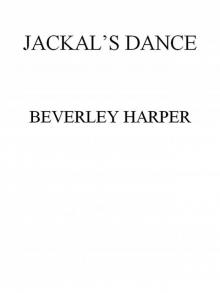 Jackal's Dance
Jackal's Dance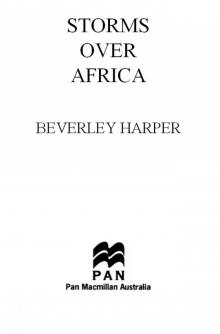 Storms Over Africa
Storms Over Africa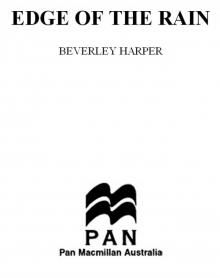 Edge of the Rain
Edge of the Rain People of Heaven
People of Heaven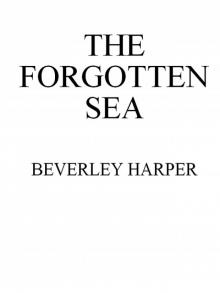 The Forgotten Sea
The Forgotten Sea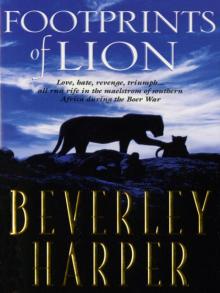 Footprints of Lion
Footprints of Lion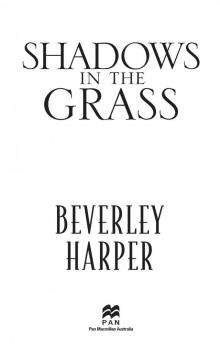 Shadows in the Grass
Shadows in the Grass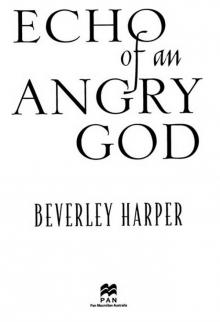 Echo of an Angry God
Echo of an Angry God